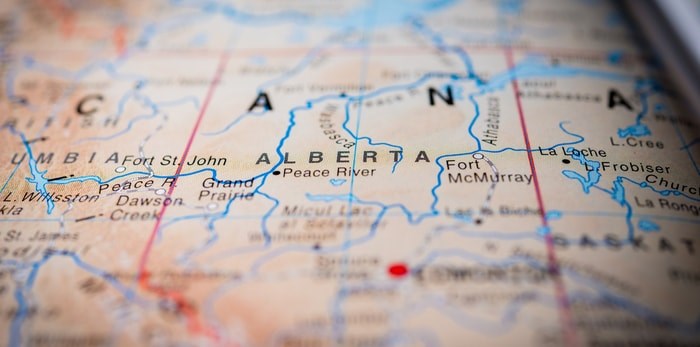Over the past couple of weeks, discussions about separatism in Alberta have become omnipresent in social media.
 Alberta on the map/Shutterstock
Alberta on the map/Shutterstock
While the focus on this particular aspect of isolation may seem new, there have been many instances of Albertans complaining about the direction of their province and their country over the past three years. The criticism levied at Premier Rachel Notley and Prime Minister Justin Trudeau has been legendary in its vitriol, even backfiring with its own memes over the proper spelling of coup d’état.
Peter C. Newman wrote about his experience covering the rise of the Reform Party in Alberta in the early 1990s. The crowds would assemble for a meal of take-out fried chicken and a discussion on “Western Alienation.” After all the speakers had their say, the greasy buckets would serve as vessels to collect donations to the nascent political organization. It was an exciting time to rally against the perceived abandonment of a distant Ottawa governed by a Quebecer.
The next four months will bring the start of the provincial campaign in Alberta. Notley seeks a new term in office, this time against a United Conservative Party led by Jason Kenney. Next fall, Albertans will be able to register their displeasure against the federal government, in a campaign where – depending on the success of Maxime Bernier’s People’s Party – the conservative forces could be split.
So, Albertans who are deeply dissatisfied with the status quo have to wait. Or they can seek solace in social media to muse about “separation.”
I first had a chance to ask about Alberta “being better off as its own country” in , as part of a survey conducted prior to Heritage Day. At the time, with a Progressive Conservative government provincially and a Conservative government federally, 23 per cent of Albertans agreed with the statement, and 70 per cent disagreed with it.
, with Notley in Edmonton and Trudeau in Ottawa, the same proportion of Albertans – 23 per cent – said they would be better off as an independent country, and more than two thirds (69 per cent) disagreed.
Research Co, asked the same question last week to a representative sample of Albertans. In spite of all the recent social media chatter and radio commentary, the needle has not moved much.
One in five Albertans (25 per cent) say they would be better off as a country in 2018, up two points since the scores registered in 2014 and 2016. And we continue to see more than two thirds of residents (69 per cent) disagreeing with the statement, including 58 per cent who “strongly disagree” with it.
So, roughly a quarter of Albertans are saying they would be better off as an independent nation. But this is not a reaction to Notley or Trudeau. Virtually the same proportion of residents felt this way in 2014, when few people imagined a New Democratic Party victory provincially and Stephen Harper enjoyed a majority mandate federally.
That being said, Albertans do consider themselves unique, with 69 per cent saying their views are “different from the rest of Canada,” and 84 per cent acknowledging they are “proud” of the province they live in.
In addition, 31 per cent consider themselves “Albertans first and Canadians second.” , 48 per cent of Quebecers placed country over province when asked the same question. In a year where support for the main sovereignist party in Quebec declined to its lowest level in history, we still have almost half of Quebecers not identifying directly with Canada. In Alberta, the figure is 17 points lower.
A two-point fluctuation on a sovereignty question that has been tracked every couple of years, through different provincial and federal administrations, is not a sign of growth. As a society, we should not give in to the rhetoric of former reality show protagonists who have found in social media the perfect vehicle for their rants, carelessly dropping words like “treason” and “hanging” along the way.
To the reporters in Alberta who have spent time on this non-story, I recall the words of former Washington Post editor Bill Bradlee: “Beware of stories you want to be true for whatever reason.” At this point, Alberta separatism is a myth. It may have provided fodder for a seemingly slow news December, but so would a discussion of whether Die Hard is a Christmas movie.


